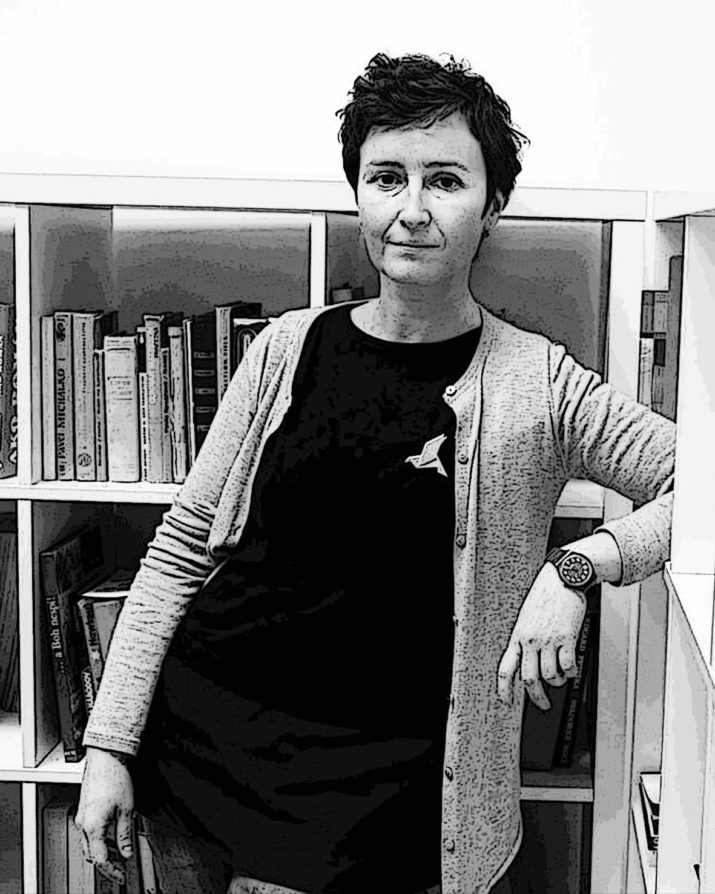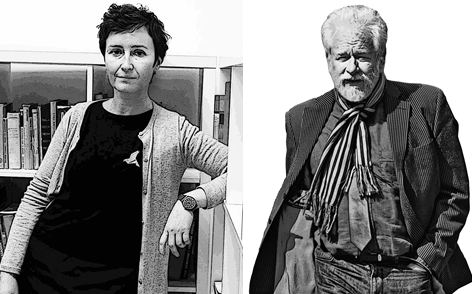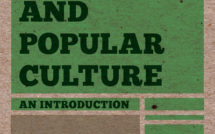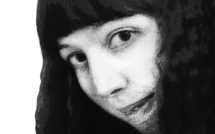

This is part of our special feature Facing the Anthropocene.
Translated from the Slovak by James Sutherland-Smith.
IN THE CITY OF DOGS
1.
Crystals grown too quickly to champ with teeth
scratch throat. with narrow fingers across
canvas voiceless retrace twists and turns.
local water next road: maybe according to old
secret recipe for a cleaning process to preserve
sludge. smell – survive survive, smell cheese
fish and small stains on surface: nothing
else, yet delicious food for dogs yesterday.
2.
mice also quick:
underground. in colour. under seats.
they seek food. between two trains.
utterly deafened: they follow – like you –
trembling wheels legs.
3.
last shells. from days previous. (cleaning
process to preserve sludge.) in darkening mirror
another of your faces.
each time belonging to a race they bewitch.
you pity for the slow, everyone, who paused,
showed palm and naked forearm, everyone
for whom private skin slid out from
sleeves much too much for eyes.
and if random smile stops in you,
it stays random.
that which you wear under your hair
and here some so often address you
over-familiar.
too long without measure: two three weeks like
different species. while they blinked, it died out.
Stumble against wall, forget in your guts.
this i: let it fossilize.
in Cuvier‘s museum simulating body with
spine in a crazy smirk.
ILLUMINATED CITIES
1.
Summer does not depart, remains as inflammation on stale roads.
hot stone, not even traces of steps (and yet moist air);
wounds do not heal, the same movement every afternoon – wiping
dust with a hand from your eyes and oil from the scorching wheel. October.
Not even a return: enduring in the gaps – the city does not remember,
neither do you want to: numb footsoles, chapped hands, why not confess –
alley, passage, the street dicloses from behind the corner instead of (another)
memory. Next. Likewise.
And on a platform a madman, completely shabby
(nobody has been scared by him), the transfer station Réaumur Sébastopol:
at the very top a man is asleep in his socks,
from one a bandage sticking out, but only a few dare to cover their nose.
Outside a window without blinds someone is getting drunk,
all alone, behind a window with a blind I do my face,
I don’t air the room, quietly I set the phone,
and finally fall asleep.
2.
Finger code, noise, secret entrances, angry with yourself
for recklessness (in the first moment) for reasonableness (in the second)
and resenting the solitude – what virtue? In terms of eternity
it’s all the same, whether in this world alongside this body
(or with another), in terms of the moment: vote emptiness. And wait.
Old woman, not really old, rather already burnt up, perhaps senile
and perhaps deranged from the year dot, rides up and down the elevator,
greets the world at large, repeats aloud, “Yes, yes” to the numb,
with an obliging expression says to everybody “Sir, Madam”,
and touching the cheeks of children with her fingers.
With a skewer to the belly, to another a word to the heart:
Quarantine, forty days of silence.
Flame, cellophane, a scorched idea
you infect the whole colony by yourself and you wonder,
if they’ll condemn you.
3.
There are houses made of wood, plastered or just canvas pasted on,
carpets instead of walls, in the corners cables, in the cracks dust
and wind under the door.
An instant boil kettle, microwave, double cooking plate,
whoever sleeps,
doesn‘t move. Follows the meanders, doesn‘t detect that on the banks
there’s no green, doesn’t notice pavements, continues further,
to where they ride a camel,
with a rucksack on their back,
where grey blocks of flats stand in the sand only they gleam,
as in the suburbs,
and under the windows tents,
a fountain without water and the sky in flames,
do you want to return to the river, there’s no way,
– not in a dream, and therefore not at all –
and it’s enough to open your eyes, run along the walls.
burning carpets, acrid smoke
barefoot without aprons:
these stairs
still standing.
4.
They said that the treatment of the trees would absorb
a tenth of the budget and would not be effective.
The disease spreads from the Balkans,
it remains there unrecorded,
and therefore they’ve agreed to felling without protest.
They’ve opened a vertical steel space,
a glass palace, they’ve protected themselves with light that
by degrees penetrates up to the dark
uncontrolled areas,
expelling parasites purifying mycelia,
if need be isolating it from the healthy core and
not allowing infection.
The labyrinth of cold light
smoothes faces, removes their features
and a sharp finger points at the sick.
5.
Shifting under the surface of the road, by submerged river,
vena cava places, on the banks drying out
the foundations of dwellings, filling cracks
with one’s own warm body,
with a working tool like an extended arm
catching more fortunate lives:
bourgeois families, three children, four cars
and a pedigree dog.
In slow motion installing the seals,
dams for the elements,
and secretly leaving in them a reserve
at least for a single saucy hair.
Returning during the night
capillaries of urban circulation
and humbly waiting as long as the other
untamed world does not awake.
6.
Suddenly it is here:
in whole flocks
they tumble down headlong
like fossilized birds.
the wind blowing their writing, ash
in hair, cooling pavements,
soft and cosy,
full of splinters and rubble, broken bodies.
The closed arms of the built over earth:
with eyes covered with a band of glass wool
she indifferently offers a smile to the cameras
and in the general hubbub silently
focuses on a lower trembling
tickling the soles of her feet,
after which hurtle packs of stampeding
rats.
7.
Witness of, not survivor of.
Every perception remains under the skin,
You press, it hurts: you know where you have to press.
Phantom pain
hurts just like the real.
Travelling in large machines, wedding at their mercy
and only then feeling fear.
Walking around cities.
You know where you have to go. You know where to look.
Only rarely do you talk about it.
TIDAL EVENTS
Simply they’ve come out of the woods.
The whole herd slowly
setting out for the city,
Their hooves knocking
on the tarmac:
cars pull over,
they pour from the roads.
Roebuck and doe
have headed to the houses,
kneeling in front of gates,
folding their bodies on lawns,
pavements, roadway
and crossroads.
They bleat monotonously,
yet turn their heads away,
if someone wants to stroke them.
Every day
the new and new kind
lose their shyness.
They approach us,
look us in the eye,
lead us to the sea.
Without fear
together we stop to breathe.
Mária Ferenčuhová was born in Bratislava in 1975 and is a poet, translator and film theorist. She has published four collections of poetry, Skryté titulky (Hidden subtitles, 2003), Princíp neistoty (Principle of uncertainty, 2008), Ohrozený druh (Threatened species, 2012) and Imunita (Immunity, 2016), also a study of documentary film, Odložený čas (Time delay). She is editor of the of the film magazine, King-Icon, translates from French and teaches at the Academy of Performing Arts in Bratislava and the Academy of Arts in Banská Bystrica.
James Sutherland-Smith was born in Aberdeen, Scotland in 1948 and is a lecturer in British Cultural Studies in the Institute of English and American Studies at Prešov University, in Prešov where he has lived since 1989. He has published six full collections of his poetry, the last being his poem cycle, Mouth, published by Shearsman Books in 2014. He has translated a number of Slovak poets into English for which work he received the Hviezdoslav Prize in 2003. In 2014 he was awarded the Zlatko Krasni Prize at the Smederevo Poetry Festival for his translations of the Serbian poet, Ivana Milankov and a Selected Poems of Miodrag Pavlović was published by Salt Publications in 2014. In 2018 he published Multiple Visions, an e-textbook for university students on the theory of Cultural Studies and in 2017 he will publish a selection of the poems of the Slovak poet, Ján Gavura,The Other Monk and a selection from the poetry of Mária Ferenčuhová, Tidal Events.
Photo: Mária Ferenčuhová, Private
Photo: James Sutherland-Smith, Private
Published on May 2, 2017.




